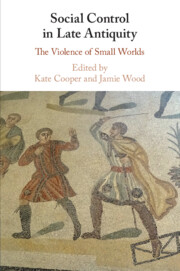Book contents
- Social Control in Late Antiquity
- Social Control in Late Antiquity
- Copyright page
- Contents
- Contributors
- Preface and Acknowledgements
- Abbreviations
- Introduction
- Part I Women and Children First
- Chapter 1 Female Crime and Female Confinement in Late Antiquity
- Chapter 2 Holy Beatings
- Chapter 3 Power, Faith, and Reciprocity in a Slave Society
- Chapter 4 A Predator and a Gentleman
- Part II ‘Slaves, be subject to your masters’
- Part III Knowledge, Power, and Symbolic Violence
- Part IV Vulnerability and Power
- Bibliography
- Index
Chapter 3 - Power, Faith, and Reciprocity in a Slave Society
Domestic Relationships in the Preaching of John Chrysostom
from Part I - Women and Children First
Published online by Cambridge University Press: 18 September 2020
- Social Control in Late Antiquity
- Social Control in Late Antiquity
- Copyright page
- Contents
- Contributors
- Preface and Acknowledgements
- Abbreviations
- Introduction
- Part I Women and Children First
- Chapter 1 Female Crime and Female Confinement in Late Antiquity
- Chapter 2 Holy Beatings
- Chapter 3 Power, Faith, and Reciprocity in a Slave Society
- Chapter 4 A Predator and a Gentleman
- Part II ‘Slaves, be subject to your masters’
- Part III Knowledge, Power, and Symbolic Violence
- Part IV Vulnerability and Power
- Bibliography
- Index
Summary
This chapter evaluates the links between the power balance in household relationships and Chrysostom’s preaching on pistis (normally translated as ‘faith’). It argues that, for Chrysostom, pistis is closer to faithful obedience than cognitive belief and analyses how Chrysostom used the expected norms of faithful obedience in household relationships to reinforce congregational faithful obedience to God. The chapter uses this preaching to expose the unequal, reciprocal, and sometimes violent nature of the relationships in the late antique household. It also demonstrates how Chrysostom attempted to regulate the household through reinforcing existing power imbalances in relationships, benefiting the paterfamilias as husband, father, or master. Faithfulness to God and the paterfamilias are intertwined. Wives are exhorted to be faithful to and obey their husbands. Sons are expected to obey their fathers. Slaves are encouraged to be loyal and obedient. Masters are encouraged to treat slaves as if they were their own children – fictive kinship – but in practice this amounted to little change. Chrysostom preached a potentially revolutionary message about faithful obedience to God, but recast it into safe exhortations and a defence of existing societal structures.
- Type
- Chapter
- Information
- Social Control in Late AntiquityThe Violence of Small Worlds, pp. 59 - 75Publisher: Cambridge University PressPrint publication year: 2020

